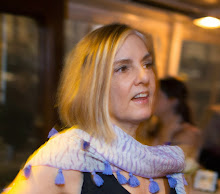Well, I lied about taking a break from the blog. I'm thinking a lot these days about writing and how to structure my own life such that I nurture my writing life. Since I've become a director of an MFA program (4 years ago), I've found it increasingly difficult to find the time I once was able to find for writing. It's not just the time that the job takes, it's the fact that I can't leave it at the university. It haunts me at home and in my dream life, and there's always something that needs to be done, or some small crisis that needs attending.
Part of this is my own personality, of course. I'm something of a perfectionist, and I really care about my program and students. Building a program is not unlike writing a book, except that you are creating a space for others to flourish again and again, not just the one time they read the book. These last four years have been rewarding in the sense that I feel I've been giving back some of what I've gotten from the world. And I'm a pretty good administrator.
But positions like the one I have should be rotated, I think, especially if you want the writer who is in the position to stay alive. I'm beginning to feel that I need to rotate out for a little while.
Aside from the issues of free time anyone might feel in a job that demands a lot of your energy, both intellectual and emotional, another issue for me is simple organization. Sometimes the best way for me to get a poem or essay written is to put it on a To-Do list and make sure it finds a place in my calendar. In fact, this is the best advice I could give to someone stuggling with finding the time to write: put it in your calendar. No matter how busy you are you, you can always find an hour to write, and if you schedule it when your body and mind are sharpest--for me it's the morning--you give yourself a better chance that you'll write something good.
Sharing your life with someone can also affect the kind of energy you bring to writing. When I lived alone it was easy to get up in the morning, grab my coffee, journal or laptop, and spend the first hour or so of the day writing before any other concerns infected the spirit of writing. But now that I'm married to a journalist who likes to sit in bed with me in the morning and read his email and check out the international newspapers online, I find myself doing that--reading email and checking the news headlines--for about an hour instead of spending that time writing. For my husband it's a shared time of bonding, and I feel that too and would hate to lose it--we do talk in the midst of sending emails and checking the news. But it's also lost time for me because I do have to leave and go to the office to do administrative work, so I've lost that hour of creative work. He's a freelancer and when I'm off to work he stays home and writes, and since he's a journalist, his searching of the newspapers is relevant. Not always so for me.
Finally, there is the issue of what to write and what's worth writing about. There can be times when you order yourself to write, when you write it on a calendar, you put it on your to-do list (Write that Brazil poem this Saturday!!!!) or when you negotiate hard-won space and time with your partner only to find that nothing comes, that nothing seems worth writing about, that nothing seems to inspire you. Then, I think, it's time to get at the root of the problem.
People talk about "writer's block," but I think feeling stymied or paralyzed with writing is a side-effect of something else. If you order yourself to write and you don't do it, well, it's like trying to stop drinking cold turkey without trying to understand the spiritual desires and other needs that drove you to drink in the first place.
So an important step in trying to identify what's causing a slow-down in writing is to think about what's missing in your life. If a poem or a story or essay is like a plant--let's make it a rose bush--what does it take to make it flourish? Sun, just enough, water, just enough, good soil.
When you are having trouble writing ask yourself about your sun, your water and your soil. And remember that we are all different and have different needs. What are your needs?
For me it's time, space and the freedom and tools to explore what really matters in my life and the world. And sometimes the news, email, facebook, it's all too much information, too much communication. I still believe that the best writing gets done in a space of utter aloneness.
Maybe we don't need to "keep up" with everything--see Pico Iyer's comments on this in "The Joy of Less" :
http://happydays.blogs.nytimes.com/2009/06/07/the-joy-of-less/?em






 I recently returned from a trip to Salvador, Brazil with students. One of the things that struck me the most while there were the women we met, especially the older women.
I recently returned from a trip to Salvador, Brazil with students. One of the things that struck me the most while there were the women we met, especially the older women.